
HISTORY

Considering
that it would turn out almost absurd to illustrate the vicissitudes of a country
in little lines, we will dwell upon some of the more meaningful episodes of the
tormented history of Albania and Albanians.
The people of the eagles is much more than what the daily news
report and I hope that a reconstruction, even though limited, of its past , can
be useful to know it better and to appreciate it.
|
The
origins of the Albanian people are, even today, still circumstantial.
One of the first written evidences of the use of the word " Albanoi
" goes back to the 130 A.D., in a work of Tolomeo. Approximately
a millennium after, some Byzantine writers use the words Albanon and
Arbanon to indicate the region of Kruja. Under the Angiņ, in the
XIII century, the names Albania and Albanenses indicate
the whole country and all the population, as it is demonstrated by
the works of many ancient Albanian writers such as Budi, Blanco and
Bogdano. In
their language the Albanians call themselves " Shqipėtarė
", term that for many linguists had originally the meaning of " the
eagles ", from Shqiponjė (because of the large presence of
these animals
in the mountainous zones of Albania) and that for others , can instead
indicate " those who understand ".
The
Italo-Albanians and the
Albanian minorities( still present in Greece) have been called in
different ways with the passing of the years:
Arbėnuer, Arbėnor, Arbėneshė, Arbreshė;
this last term derives from Arbėria or Labėria, that refers
instead to a region situated in the south of
Albania. Long studies
attribute the origins of this race to the stock of the Thracian- Illyrian,
populations who lived in the Balkan territories since from the III
B.C. The relationships
between the Illyrians and the Greeks have been often conflictual, however
it is the rise of Macedonia
to threaten in the most serious way the Illyric supremacy.
Between the 229 and 168 B.C., Rome conquests the South of Illyria,
but the Romanization of these zones, that stretch from the Danube to
the north of Albania, is not easy at all , because of the rebellious
nature of the inhabitants. In these lands two various spheres of influence
collide: the Roman and the
Greek one, the last one is particularly
rooted in the south of Albania. With
the division of the Holy Roman Empire, the Southern Illyria becomes part
of the Eastern Roman Empire , but also a field repeatedly invaded by
those people who wanted to move from Asia towards Europe.
|
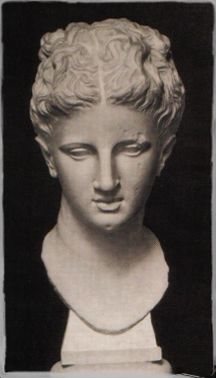
THE GODDESS OF BUTRINTI
AUGUSTUS' BUST - BUTRINTI
|
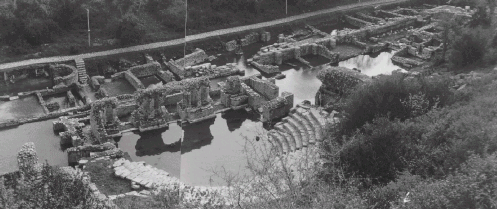 |
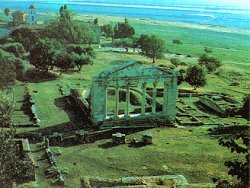 |
BUTRINTO - SCAVI APOLLONIA
Because
of its particular geographic position, the political and economic life of
Albania has always been tormented and difficult.
The Albanians have been brave soldiers, pirates, mountaineers, and they
have often shown courage and intelligence, supplying moreover the strongest and
trusted men to the formations of Constantine the Great, Alexander, Pirrus,
Dioclezianus, the Sultans, but above all to the army of Skanderbeg.
Albania has always furnished valorous sailors to Greece, Rome and Venice,
and the attractiveness of the Albanian women was recognized and appreciated in
the whole Balkans. The lack of stability during the evolution and the
development of this country is due to the continuous state of tension of this
people, always ready to dig up the hatchet for undeniable historical and
geographic necessities.
|
A land divided between feudal lords who often fought
for the hegemony, Albania of XVI century is not still a united nation, but
an agglomerate of little princedoms and lordships. The conception of an Albanian national identity seems to
assume a meaning with the beginning of the brutal and long-lasting Turkish
oppression, in the second half of the 1300.
Perfect and powerful war-machine, the Ottoman army, one of the most
equipped and imposing of the
time, asserts its own authority in many Balkan countries, often
engaging with the hostility and the stubbornness of the occupied
peoples. The Albanians nobles
are almost all reduced in conditions
of vassalage and submission to the Turkish central power and the
Islam is imposed with violence. But
Albania is also an attractive strategic point on the Adriatic sea, is a
country that is living a period of economic
development, thanks to the commerce with the near coastal cities.
Therefore if the Turks make sure the control of Vlora, Argirocastro
and Kruja, the Serenissima takes possession of Shkodre, Dulcigno and
puts under his own jurisdiction Durres and Antivari.
Because of the largeness of the Ottoman army, Venice prefers to pay
taxes for the maintenance of its own lands, but this does not imply that
the relationships between this two
powers are pacific. Anyway it is in this difficult context that
appears the more charismatic figure of the Albanian history , a man
able to guide a people towards the conception of a national conscience. |
( "KULLA", ALBANIAN BRICK BUILDING ) |
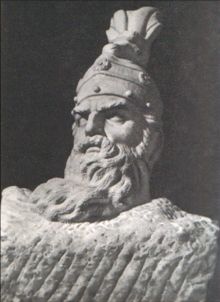 |
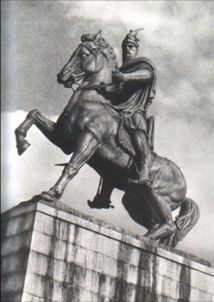 |
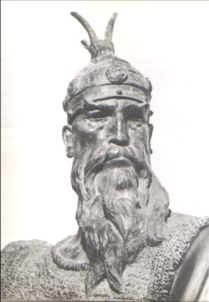 |
Gjergj Kastriota " Skanderbeg " - Albanian National Hero
Approximately in 1430, two of the most authoritative
noble Albanian families, the Castriota and the Arvaniti, rebelled to the
intimidations and the abuses of the Turkish central power, collecting the
support of the Christian Lords of the North and the centre of Albania.
If the Republic of Venice opts for a political of non-intervention, aids
for the rebellious Albanians arrive from the Reign of Naples and from Hungary,
even though after some battles they are forced to withdraw the troops.
Divided by the rivalries between the clans and the lack of a central
nucleus of organization, Albanians do not succeed to opposite with continuity to
the Ottoman terror. Unsubdued and
resolute warrior, brave and fearless leader, but also a cultured and intelligent
man, George Kastriota " Skanderbeg
marks with his feats the destiny of his fellows countrymen, between
history, myth and legend. The more
reliable testimonies describe him as the son of a rebellious vassal. The little
George had been kidnapped at the age of 9 , with his two brothers, by the sultan,
because of his father unruly character. The Turkish empire often used to kidnap
the young scions of the noble families belonging to the subjected people
in order to make them study at the Ottoman
court, with the aim of introducing them subsequently in its military organisms.
These kidnappings had therefore the double purpose of enslaving the
families and to upgrade the imperial structure. After having attended with full marks the Turkish
military schools, Castriota earns the rank of General in the Ottoman army.
|
But in the evening of
November 4 1443,
during a battle, Skanderbeg abandons its army to return towards Albania,
his native land, which he has always secretly missed, without regard for
the magnificence of the court and of military atmospheres.
Actually this was the performance of a premeditated plan.
His goal is clear: to organize a firm and tenacious rebellion against the oppressors. During
the conflict between Turkey and Hungary, Skanderbeg, with his men,
reconquers the territories embezzled by force to his
father and the November 28 1443, he enters in the little city of
Kruja, capital of occupied Albania and
lowers the emblem of
the Turkish half-moon hoisted
on the walls, in order to raise the banner of the black two-headed Eagle
on red ground, proclaiming moreover a famous phrase, drawing the attention
of the astounded and fervent
people: " Freedom
Ive not brought
it on you...I have already found it between yourselves". This
symbolic and legendary deed becomes a true challenge to the authority of
the sultan Murat.
It begins, therefore, the long-lasting fight ( which went on for
approximately 25 years ) , between the Turkish superpower and the small
rebel Albania. The Ottoman
empire employs terrifying armies, guided from the more able generals.
But beyond his military skill, Skanderbeg shows to be also a witty
political man. He creates the
" Albanian League ", also called " League of Lezhė ",
composed by the rebel feudatories, who put at disposal their own armies.
Demonstrating all the shrewdness and astuteness of a great
strategist, Skanderbeg succeeds in defeating the Turks many times, in
spite of the numerical inferiority. After every failure, new armies, more and more numerous,
are flung on the rebellious,
but the result are always the same :
the Albanians resist and drive the invaders back.
When Murat died, the new sultan Mehmet II, the " conqueror of
Constantinople ", decides to settle quickly and with firmness the
Albanian matter . In the meantime the reputation of Skanderbeg and the
hypothesis of a probable demand for independence, begin to worry the
Republic of Venice and some members of the League.
The Serenissima places
a price on the head of the Albanian leader.
In the 1450 Mehmet II enters in Albania with an immense army under
his command, the most powerful and better armed of the time. But once again Skanderbeg wins, making good use of the
agility of his light cavalry and of a better acquaintance of the places.
The sultan returns to Istanbul, but he swears revenge.
After this victory, Skanderbeg tries to transform the League in an
embryo of central state, but luck seems to turn her back to him.
Many noble , alarmed by the independence sights and the
fear to lose their own lands, withdrawn from the League.
Even Hamza Castriota, cousins and trusted Skanderbegs right-hand
man, passes from the part of the Turks, corrupted by the enticing offer of
land privileges. Venice categorically refuses every type of collaboration
with the rebels. The city of
Ragusa and the King of Naples Alfonso V of Aragon, support the initiative
of George Castriota but they do not send concrete aids.
The Papal State guarantees the work of the subversives
and promises to send troops against " the Turkish infidel
", but on condition that the Albanian leader would lead its army
against the orthodox believer. Skanderbeg
refuses ulterior war involvements. Disheartened,
alone, betrayed, encircled by skepticism
and mistrust, the man of the rebirth seems destined to abandon its plans.
The star of this great personage seems to blow out
slowly, but it is just in this context that begins one of the most
important moments of the history of Albania.
Disappointed by the nobles , Skanderbeg, the
" soldier of Jesus Christ ", " the prince of the
Albanians and of Epirus
" finds the support of
his own people, enraptured by his courage and his charisma. From every
corner of Albania, arrive men ready to fight for him ;
even the " Gheghe ", free mountain dwellers come down
from the mountains in order to serve this man whose reputation goes beyond
every distance. Not a trained
army, but a formation of common people is ready to fight against the
Turkish violence, after years of robberies, abuses and offences. Among
them seems to spread only a word:
Freedom . The true
epic of Skanderbeg begun. In
the autumn of 1457, in Kruja, this small and heroic army inflicted a
strict defeat to the Ottoman empire . The tenacious Albanian people
resists. Later, because of a
serious scarcity, Albanian peasants, which constitutes the greatest part
of Skanderbegs army, falls on their knees.
In this period Giovanni Hunyadi king of Hungary, brotherly friend
of Castriota, dies. In 1456, Turkey reorganizes the war effort. The city
of Kruja is occupied and freed many times. Skanderbeg fight bravely until
the end and tries to raise the pride of the nobles .
But in the 1468, exhausted by the hard work and by the fever , he
dies leaving an empty place in the mind and in the heart of the albanian
people. The sultan Mehmet II
comments therefore the news of Skanderbegs death: " This land will never give birth again to such a lion
".
The figure of this man is destined to become the symbol
of the pride and the desire of freedom of Albanian people. Translated
in many languages, its epic deeds can also be interpreted as the history
of every people subject to embezzlements, of every overwhelmed minority
that fight for its own dignity and independence. |
P. MELE - Skėnderbeu
Tirana
- Skanderbeg's statue
XVI Century Italian Painting
The epopee of Skanderbeg has been translated in many languages. These are some of the italian, english and french books, even tragedies, tales, and epic poems freely inspired by the story of the Albanian leader.
Donika, Skanderbeg's wife: XVI Century Italian Painting
|
-----------------------------------------------
After Skanderbegs
death, many Albanians escaped from their land for fear of Turkish
revenge and they took shelter
in Italy (in Calabria, Sicily, Apulia and Basilicata), constituting the
Arbėreshė communities. The
rebellious Albanians which remained in their native land continued their
battle against the invader under the guide of Lek Dukagjni, founder of one
of the main behavioural and legal codes of the time, the Kanun.
The last great uprising happens in the 1499.
The Albanians face the enemy lead by a young commander, Gjergj
Castriota, homonymous grandson of Skanderbeg, who wanted to emulate the
great leader. But even the
charm of the symbols and of the myths is crushed under the weight of the
hard truth and of an enemy this time incomparably and undoubtedly stronger
.
|
|
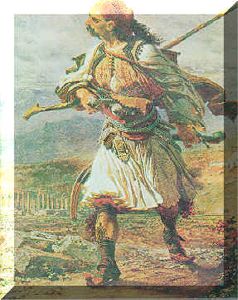
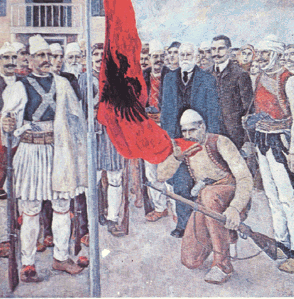
The Ottoman dominion goes on also in 1700 and 1800,
although popular commotions and putsches took place. But the Europe of these years is not at all static, to the
contrary it seems to change slowly, but constantly, its face.
The conference of Vienna of 1815, that has the goal to redefine the
borders of the European territories after the defeat of Napoleon, grazes only
the Balkan issue. Russia, and in
part Austria, seriously challenge the authority of the Turks on many territories
of the East of Europe, supported also from the ambitions of independence of the
occupied people. In 1877 Russia starts the hostilities against the sultan, and
obliges him to sign an armistice in 1878. Bulgaria
becomes independent, Serbia and Montenegro obtains independence too , like
Rumania, even if it lose some territories. With the Conference of Berlin, in the
1878, Bosnia and Herzegovina become Austrian protectorate, while Albania
re-enters among those regions that remain under the Ottoman sphere of influence.
The conference of Berlin will be fundamental for the Albanians conquest of
freedom . The national ferment
grows because of the more and more ferocious Turkish persecutions and for the
fear of the dismemberment of Albania between Serbia and Greece.
Always in 1878, Albanians of Albania and Kosova joined together in the League
of Prizrend, and they loudly speak up in Europe, requesting independence.
-------------------------------------
"... Russia, that before insinuated and almost
imposed in Europe with the pretext of the Christian religion, of which it
proclaimed to be the defender in the East, now that it has declared with open
language and with the triumph of its arms the scope which it aimed, has lost
every prestige in Albania as in Greece, where people contemplate with disdain
mixed to terror the formidable course of its invasions. And it is for this
reason that these populations
anxiously invoke the support of the great Nation, the only one that can prevent the total
ruins of their native land and the disappearance of the name " Albania
" from the map of Europe. It
was this fear that refrained the Albanian tribes ,
eager to free themselves from the Turkish tyranny, from striking up an
alliance with the heroic Montenegro, that we justly considered, and we
still consider, as the vanguard of the Russian armies.
It was the same fear that withheld us from receiving the offers proposed
us by Russia, that for opposite goals tried to annex our land and wipe out our
national identity. As we are not
and we do not want to be Turkish... therefore we will oppose with all our forces
against anyone wants to oblige us to be Slavics or Greeks.
We want to be only Albanians.
" Memorandum sent by the
Albanian League of Prizrend to S.E. Lord Beaconsfield, First Minister and
delegate of his Majesty the Queen of England during the Conference of Berlin
(1878)
------------------------------
Some years before, in a letter sent in the 1866 to the
Princess and writer Dora d' Istria, even Giuseppe Garibaldi
" the hero of the two worlds " wrote : " the cause of
the Albanians is also mine. I would be glad to employ what still remains of my
life, fighting at this proud peoples side ". A
small pawn, but of a remarkable strategic importance, in the immense European
chessboard , Albania must wait for the conflict between Turkey and Italy (1911 /
1912) - that fight for the conquest of Libia -
to reclaim its independence. Once
again the numerically modest but impetuous and fervent people of the eagles,
begins its rebellion in 1911, refusing the political programs of the
" Young Turkish ". The
inner contrasts, some times of religious motivation, do not lack and slow down the enterprises of the rioters.
The attacks begin, involving the south, the north, the centre, the
district of Jakova and Kosovo. The armed revolts make known personages as Bajram
Curri, Elmas Xhaferi, Themistokli Gėrmenji, Abdi Totani, Ded Gjo Luli, that
defeat with their armies the Ottoman invaders.
The outcry diffused between the people is " neither Greeks, neither
Slavics, neither Turkish... we want to be only Albanians!
". The national independence arrives also with the help and the
cultural support of the Albanians living beyond the borders, in particular of
the Arbėreshė, the Albanians of Italy.
In the conference of London (1912-1913) the frontiers that will delimit
the Albanian territory are drawn up. The 28 November 1912, Ismail Qemal raises
in Vlora, the flag of his free native land.
In 1914 Albania is recognized by the other nations as an independent
state.
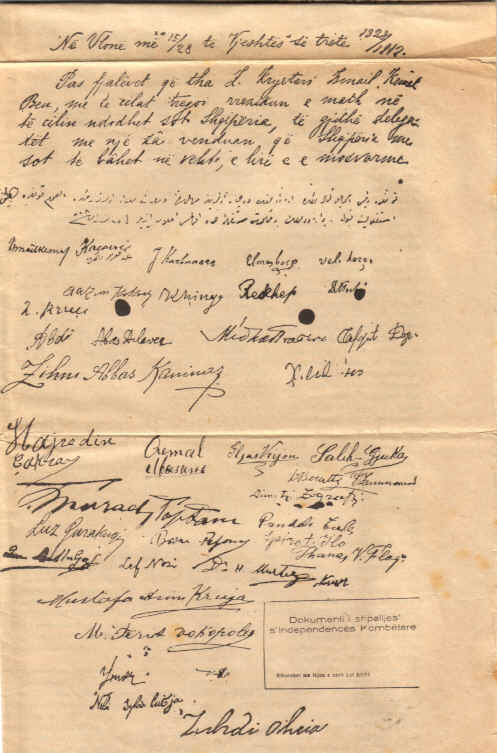
( Albania's Declaration of Independence )
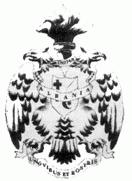
Between the First and Second World war Albania is grazed by the sad vicissitudes and the episodes that take place in Europe. After numerous contrasts between the parties, Albania becomes a constitutional monarchy and Ahmed bey Zogu (or Zog as is later called), is elected King in September 1928. Between 1929 and 1932 the guide of the state is therefore entrusted to this personage discussed and opposed by many persons. In the twenties and thirties the relationship between fascist Italy and Albania are intensified and culminated, for the Shqipėtarė country, in a condition of semi-protectorate and pacific alliance.
|
With the rise of the National Socialist party of Hadolf
Hitler, a new shake took place on the European borders.
The incessant advance of the Teutonic power sow death, terror on a
background made by mass deportations, massacres and violence. Mussolini,
bewitched by the authority of the Austrian dictator, tries to demonstrate
his own authority conquering Eritrea and entering triumphally in Albania
in 1939. But this last occupation does not have a great military valour
because they probably secretly entered in an agreement with the king Zog (escaped
in Greece) and also because of the Albanians insufficient resistance .
In the April of 1939, the Italian monarch Vittorio Emanuele III is
elected King of Albania. The
land of of Skanderbeg becomes an Italian colony.
The idea of Mussolini is to use Albania like a
corridor, useful to
reach the invasion of Greece; enlisting Albanian troops, promising them a
part of the Ēamėria (Greek territory mostly inhabited by an Albanian-speaking
population ) and of the Kosova. The
hypothesis of a " Great Albania " seems to entice many persons.
All the democratic and communist Albanian political groupings
opposed against the fascist oppression, and they created a common front of
resistance. It borns
therefore the Lufta Nacional Ēlirimtare, the "
Movement of National Liberation ".
The antagonists of the partisans are instead the Balli Kombėtar,
nationalist and anti-communist groups.
The war in Greece is a real disappointment for Mussolini.
The human losses are important and the defeat is evident.
Some Italian soldiers find shelter in the villages, while others
(between them the army " Antonio Gramsci ") abandons the last
combats with the Greeks and they join the Albanian partisans. With the fall of Mussolini, the Lufta organizes a
" Committee for the Salvation of Albania " and they hold the
reins of the government.
|
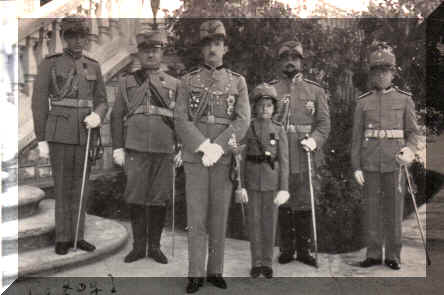
( King Zog I )
King Zog's building
( Vlora - Monument to the partisans )
|
|
With the constitution, later , of the popular Republic
and the rise of the figure of Enver Hoxha, the history unavoidablly leads
us to our days . In 1946
Kosovo is given up to Yugoslavia in exchange for economic aids and
Hoxha, university professor of French, soaked in Marxist and Leninist
principles, begins one of the most pitiless dictatorships, based on the
oppression and the persecution of the political adversaries.
Great admirer of Stalin, Hoxha breaks off the relationships with
Russia that, ready to a greater opening, entrusts to Krushėv.
The collaboration with China finishes later on, for the same
reasons. Albania is then
absurdly isolated from the European events for many years, guided by a
regime that considers superfluous even the most essential needs.
|
( Enver Hoxha ) |
To speak in an exhausting way of the dictatorship of Hoxha would demand a lot of space , but the books and the testimonies surely do not lack. Just think that the scene of 1991 of the Albanian immigrants who disembark in mass on the port of Bari, is only the consequence of a incredibly long phase of paradoxical closing. Perhaps during these years of misery, it would turn out easy to succeed to comprise the attempts of many immigrants to reach the Italian coasts. The television, window on the world of the well-being (a world moreover reachable from the sea) has emphasized even more the state of backwardness of Albania in comparison with the standard of the other European countries. After years of misery and poverty, many Albanians have fallen into the trap of easy money : illicit activities like the prostitution and the traffic of drug and crews, this is a sad truth. But Im convinced that the delinquents, the murders do not have nationality. The character of a people has to be found in the honest workers's mind, men who swallows in hush the bitter bread of the exile, who brings in their heart the tender memory of their own motherland. The sad episodes reported by the papers, stir reflections on immigration, but in my opinion it would be more useful to discuss the causes of all this. Defending the grim criminals , the cruel murders that often appear on the first pages of our daily newspapers, would be not only inadmissible, but also cannot be proposed . However I really would like that the public opinion would observe more carefully the thousand histories of many families, histories of deprivations, histories of misery, histories that remember those of many Italians emigrated during the post-war period.
Albania today is a developing country, with an uncertain economy and with obvious infrastructural deficiencies and that fundamentally still looks for an equilibrium. However positive and comforting news comes from the other part of the Adriatic. The interest of many Italian entrepreneurs and not, emphasizes in fact that, after do-nothing policy years, finally something is moving. The hope is that the Albanian people can effectively enjoy and make good use of the fruits of this small economic and industrial awakening.
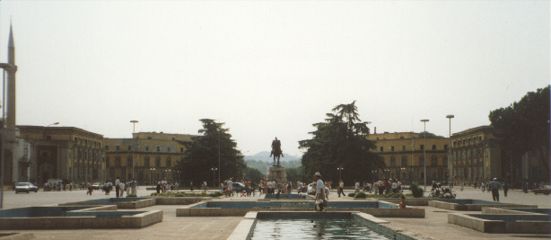
Tirana - Skanderbeg Square
The true face of today Albania is sometimes
indecipherable. To anybody
who refuses to pursue the easy mental path that leads to
prejudgments, it is demanded an effort, the effort of the acquaintance,that
stems from the encounter, the exchange, the acceptance and not from the refusal
of the alterity. I would sincerely thanks
all the people who daily and
secretly try "behind the scenes" to vanquish the plague of
racism and xenophobia, through a fundamental and precious work of popularization.
-------------------------------------
" the clarity demands acquaintance, the
acquaintance increases the tolerance, the tolerance is the only intermediary of
peace for all the forces and in all the situations "
Johann Wolfgang von Goethe
EDWIN E. JACQUES, THE
ALBANIANS: AN ETHNIC HISTORY FROM PREHISTORIC TIMES TO THE PRESENT,
McFarland
& Company Inc., Jefferson, NC 28640, November 1994.
STAVRO
SKENDI, THE ALBANIAN NATIONAL AWAKENING: 1878-1912,
Princeton
University Press,Princeton, NJ, 1967
ABDUL
B. SULA, ALBANIA'S STRUGGLE FOR INDIPENDENCE,
privately published by his family,New York, 1967.
PETROS GAROUPHALIAS , PYRRHUS, KING OF EPIRUS, June 1979.
MIRANDA VICKERS, JAMES PETTIFER, ALBANIA: FROM ANARCHY TO BALKAN IDENTITY, March 2000.
ANTONELLO
BIAGINI, STORIA
DELL'ALBANIA, BOMPIANI, 1998.
A. BIAGINI - F. GUIDA, MEZZO SECOLO DI SOCIALISMO REALE. L'EUROPA CENTRO-ORIENTALE DAL SECONDO CONFLITTO MONDIALE ALL'ERA POST- COMUNISTA, Torino, 1997.
AUREL PLASARI, LA LINEA DI TEODOSIO TORNA A DIVIDERE, BESA, 1998.
GIUSEPPE MICUNCO, ALBANIA NELLA STORIA. BREVE STORIA DELL'ALBANIA, BESA, 1997.
GAETANO PETROTTA, SVOLGIMENTO STORICO DELLA CULTURA E DELLA LETTERATURA ALBANESE, Palermo, 1950.
GINO PALLOTTA, SCANDERBEG EROE DELL'INDIPENDENZA ALBANESE, GRISOLIA, 1988.
EQREM ĒABEJ, GLI ALBANESI TRA ORIENTE E OCCIDENTE, BESA.
EUGENIO BUCCIO, ALBANIA. FRONTE DIMENTICATO DELLA GRANDE GUERRA, EDICICLO, 2001.
GIANCARLO FUSCO, GUERRA D'ALBANIA, SELLERIO DI GIORGIANNI, 2001.
PAOLO PETTA, DESPOTI D'EPIRO E PRINCIPI DI MACEDONIA: ESULI ALBANESI NELL'ITALIA DEL RINASCIMENTO, ARGO, 2000.
ANGELO MASCI, DISCORSO SUGLI ALBANESI DEL REGNO DI NAPOLI, MARCO ED., 1990.
ROBERTO MOROZZO DELLA ROCCA, ALBANIA. LE RADICI DELLA CRISI, GUERINI E ASSOCIATI, 1997.
PIERO CROCIANI, GLI ALBANESI NELLE FORZE ARMATE ITALIANE(1939-1943), UFFICIO STORICO DELL'ESERCITO, 2001.
PAOLO PETTA, STRADIOTI. SOLDATI ALBANESI IN ITALIA (SEC. XV-XIX), ARGO, 1996.
FABIO MANISCALCO, FRAMMENTI DI STORIA VENDUTA. I TESORI DI ALBANIA, MASSA, 1998.